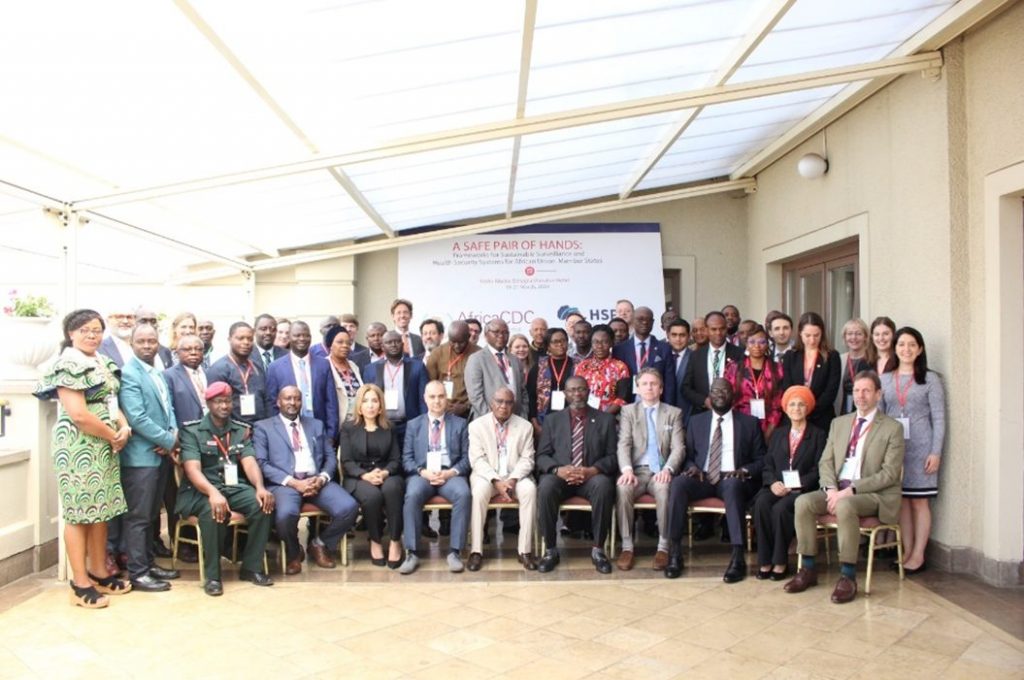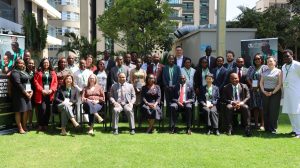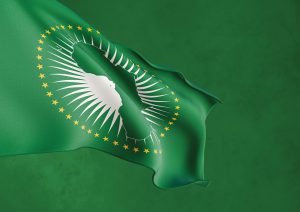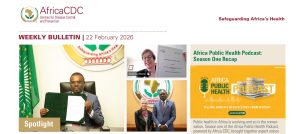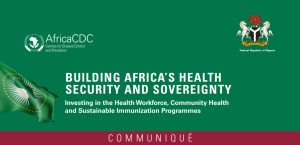Addis Ababa, 19-21 March 2024 – A coalition of partners on Health Security Partnership (HSPA), working with the Africa CDC to Strengthen Disease Surveillance and Epidemic Intelligence in Africa called for political support from Member States for their commitment convened to prioritise sustainable investment in surveillance, epidemic intelligence and biosecurity for functional health security governance.
The convening aimed at nurturing political commitment and attract investments in epidemic intelligence, surveillance, and biosecurity discussed guidelines on high-consequence agents and toxins (HCAT) developed by the Africa CDC, list, and review progress made by the HSPA in building sustainable health security governance systems in the 6 partner countries.
In his keynote address, Dr Ahmed Ogwell Ouma, Acting Deputy Director General of Africa CDC said, health security requires a collective effort and collaboration of multiple factors across all sectors, which is critical to meeting Africa CDC’s mandate.
“The success and sustainability of HSPA requires high-level political commitment and actively fostering an enabling policy environment. Sustainability demands regulatory reforms, long-term budget allocations, and recognizing robust early warning surveillance as integral to pandemic prevention, preparedness, and response” Dr Ouma said.
Under the auspices of the G7-led Global Partnership Against the Spread of Weapons and Materials of Mass Destruction, which is implementing the Signature Initiative to Mitigate Biological Threats in Africa (SIMBA), HSPA has partnered with six African countries; Mali, Morocco, Namibia, South Africa, The Gambia, and Tunisia – to strengthen epidemic intelligence, bio risk management and outbreak response capabilities across Africa for all biological threats; natural, accidental or deliberate. The Member States provided comprehensive progress reports on sustainable efforts to improve health security governance systems by their respective governments, during the meeting.
“By leveraging the strengths of a diverse set of institutional partners, the HSPA initiative represents a unique model for collaboration that aims to strengthen biosecurity on the continent. With the generous support of the Government of Canada, the WHO Hub will continue collaborating with partners to jointly support our Member States in building disease surveillance and epidemic intelligence capabilities through a Collaborative Surveillance approach”’, said Sara Hersey, Director Collaborative Intelligence, WHO Hub for Pandemic and Epidemic Intelligence.
High-level officials, decision-makers, partners and Member States had the opportunity to explore mechanisms of engaging donor institutions and private sector stakeholders on partnerships to sustain health security systems.
Biological threats are on the rise – including threats posed by the deliberate use of disease as a weapon by states or terrorists – and our efforts and commitments must rise to meet them. As part of the Signature Initiative, Canada is proud to support the Health Security Partnership in Africa and other biosecurity initiatives across Africa. These efforts, together with similar work being supported by fellow members of the 31-country Global Partnership, are rooted in our firm belief that African health-security challenges demand made in Africa solutions”, stated Ambassador Ben Marc Diendéré, Canada’s Permanent Observer to the African Union.
Africa CDC is committed to working with key partners and stakeholders through this global partnership for epidemic intelligence and biosecurity and improving disease surveillance and intelligence among African Union Member states. The agency’s efforts to foster regional health security through various policy engagement forums on the continent include the annual Oyala Health Security Forum’ hosted by Equatorial Guinea, Ministerial Executive Leadership Program, and other high-level engagement opportunities, Dr Ouma indicated.
“**END**
Media inquiries:
For media enquiries please contact:
Communication & Public Information Directorate | Africa Centres for Disease Control and Prevention | Email: Communications@africacdc.org| | Website: www.africacdc.org | Addis Ababa| Ethiopia| Facebook | Twitter
For more Information
Kyeng Mercy Tetuh | Epidemic Intelligence unit lead| Africa Centres for Disease Control and Prevention | Email: njit@africacdc.org
About HSPA
The Global Partnership is represented by Canada, the European Union, Germany, Italy (the current G7 and GP President), the United Kingdom and the United States. It has a membership of eight co-chairs of the SIMBA’s four sub-working groups. The partnership combines public health and national security expertise to build impactful, sustainable capabilities in epidemic intelligence, bio-risk management, and outbreak response.
About Africa CDC The Africa Centres for Disease Control and Prevention (Africa CDC) is a continental autonomous public health agency of the African Union that supports member states in their efforts to strengthen health systems and improve surveillance, emergency response, and prevention and control of diseases. Learn more at: https://africacdc.org

